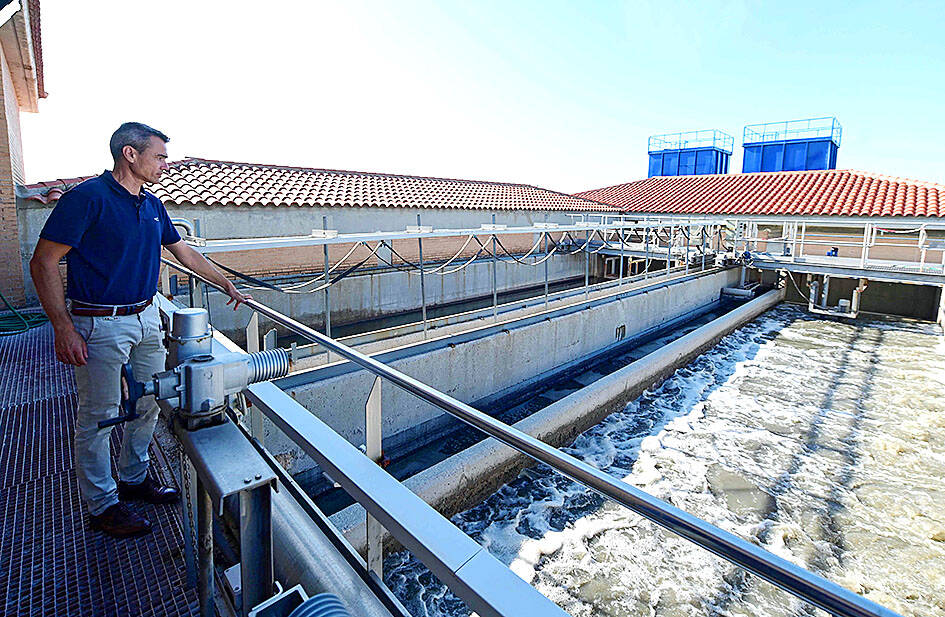With rainfall increasingly scarce, irrigating crops can be a major challenge, but farmers in southeastern Spain have long relied on recycled wastewater in a model that is winning attention abroad.
“Here the water is still dirty ... but by the end, it will be crystal clear and bacteria-free,” said Carlos Lardin, operations manager at Esamur, the public body overseeing wastewater management in the Murcia region.
At his feet, brownish water bubbled in a desilting tank, the first step before being sifted, filtered and then biologically treated to give it “a second life,” the 45-year-old engineer said.

Photo: AFP
Twenty-three years ago, Murcia — an arid region with chronic water shortages that claims to be the EU’s leading producer of fruit and vegetables — set itself a huge challenge of reusing wastewater to irrigate its crops.
To that end, the region built a network of 100 treatment plants that process and disinfect water from the sewage system so it can be reused on the fields.
This treatment, which involves sand filters and ultraviolet rays, ensures that the water “is not contaminated” and does not transfer bacteria “such as E coli” to the fruit and vegetables, Lardin said.
As a result, about 98 percent of the region’s wastewater is reused today, compared with an average of 9 percent across Spain and 5 percent across the EU, government data show.
It is an important contribution given that the central government has recently restricted Murcia’s huge water transfers from the Tagus River, whose levels have been dropping dangerously.
Esamur said that 15 percent of the region’s irrigation needs are met by recycled wastewater.
It is not enough to cover the need, but it is still important, said Feliciano Guillen, head of the Ceuti irrigation organization, which allocates water resources among farmers in northeastern Murcia.
Farmer Jose Penalver, who owns 10 hectares of land in the hills above Campos del Rio, agreed.
“Whatever [water] can be collected is good wherever it comes from as long as it’s put to good use,” the 52-year-old apricot grower said.
In his fields, an automated drip-irrigation system lets him limit water use to what is strictly necessary, in this case, two hours per day.
“Without this [recycled] water, everything here would dry up,” he said. “Every drop counts.”
Evidence of this growing interest has been seen in Murcia, where in the past few months, “many foreign delegations have come to see our facilities,” Lardin said, pointing to visitors from as far afield as Argentina and Bolivia.

A new online voting system aimed at boosting turnout among the Philippines’ millions of overseas workers ahead of Monday’s mid-term elections has been marked by confusion and fears of disenfranchisement. Thousands of overseas Filipino workers have already cast their ballots in the race dominated by a bitter feud between President Ferdinand Marcos Jr and his impeached vice president, Sara Duterte. While official turnout figures are not yet publicly available, data from the Philippine Commission on Elections (COMELEC) showed that at least 134,000 of the 1.22 million registered overseas voters have signed up for the new online system, which opened on April 13. However,

ALLIES: Calling Putin his ‘old friend,’ Xi said Beijing stood alongside Russia ‘in the face of the international counter-current of unilateralism and hegemonic bullying’ Chinese President Xi Jinping (習近平) yesterday was in Moscow for a state visit ahead of the Kremlin’s grand Victory Day celebrations, as Ukraine accused Russia’s army of launching air strikes just hours into a supposed truce. More than 20 foreign leaders were in Russia to attend a vast military parade today marking 80 years since the defeat of Nazi Germany in World War II, taking place three years into Russia’s offensive in Ukraine. Putin ordered troops into Ukraine in February 2022 and has marshaled the memory of Soviet victory against Nazi Germany to justify his campaign and rally society behind the offensive,

CONFLICTING REPORTS: Beijing said it was ‘not familiar with the matter’ when asked if Chinese jets were used in the conflict, after Pakistan’s foreign minister said they were The Pakistan Army yesterday said it shot down 25 Indian drones, a day after the worst violence between the nuclear-armed rivals in two decades. Pakistani Prime Minister Shehbaz Sharif vowed to retaliate after India launched deadly missile strikes on Wednesday morning, escalating days of gunfire along their border. At least 45 deaths were reported from both sides following Wednesday’s violence, including children. Pakistan’s military said in a statement yesterday that it had “so far shot down 25 Israeli-made Harop drones” at multiple location across the country. “Last night, India showed another act of aggression by sending drones to multiple locations,” Pakistan military spokesman Ahmed

US President Donald Trump on Wednesday said that he would make a decision about how the US government would refer to the body of water commonly known as the Persian Gulf when he visits Arab states next week. Trump told reporters at the White House that he expects his hosts in Saudi Arabia, Qatar and the United Arab Emirates will ask him about the US officially calling the waterway the Arabian Gulf or Gulf of Arabia. “They’re going to ask me about that when I get there, and I’ll have to make a decision,” Trump said. “I don’t want to hurt anybody’s